Every year around this time, the New York Times publishes a retrospective of a handful of lives that ended at some point during the previous twelve months. The retrospective is called The Lives They Led and deals not necessarily with the richest, most powerful or most famous lives, but with the most influential; men and women who mattered to us in ways that went far beyond any one act or series of accomplishments.
The lives the editors shine a light on, in other words, are some of the most impactful on the very era they helped define.
In keeping with that, let me offer you my take on one such life, a life rich and full, and a life whose impact was far greater than the sum of its parts.
 To understand Carmen Bertucci, it’s first important to understand that while his big brother Bruno may have always been the family’s alpha and his kid brother Bobby its court jester, enchanting us with his wily sense of humor, brother Carmen – or Carmie, as he was known – was always, somehow, the guy in the middle, the “other brother” who for years always seemed part-Bruno/part-Bobby.
To understand Carmen Bertucci, it’s first important to understand that while his big brother Bruno may have always been the family’s alpha and his kid brother Bobby its court jester, enchanting us with his wily sense of humor, brother Carmen – or Carmie, as he was known – was always, somehow, the guy in the middle, the “other brother” who for years always seemed part-Bruno/part-Bobby.
He was the Bertucci brother who didn’t have an ownership stake in the Patio in the right field power alley of White Sox Park, and the Bertucci brother who didn’t get his name regularly mentioned on TV by the likes of Hawk Harrelson, Steve Stone and Jason Benetti.
Like I said, Carmie was always just…the “other brother.”
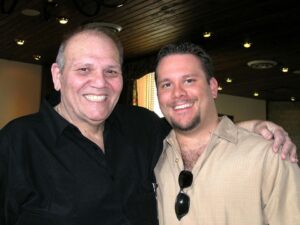 At least that's who he was to many on the outside who, unfortunately, didn’t know better.
At least that's who he was to many on the outside who, unfortunately, didn’t know better.
One other thing you probably need to know before I tell you anything else about Carmen is the nature of the place into which he was born and the place that, for the rest of his life, he'd call home.
Bridgeport, a bustling, hand-in-glove little community on the near south side, isn’t just a Chicago neighborhood. It is the neighborhood. Literally. In fact, that patch of land between 26th and 39th along the Dan Ryan Expressway is rarely, if ever called “Bridgeport” by its residents. It’s almost always referred to as simply, “the neighborhood.”
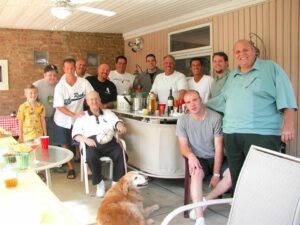 Bridgeport is a part-Italian, part-Irish, part-Slavic and mostly-Catholic cluster of homes, shops, churches and schools in a part of town that for years bred mayors, aldermen, cops and firemen the way other parts of the city bred sewer rats.
Bridgeport is a part-Italian, part-Irish, part-Slavic and mostly-Catholic cluster of homes, shops, churches and schools in a part of town that for years bred mayors, aldermen, cops and firemen the way other parts of the city bred sewer rats.
Bridgeport is that wonderfully, if not uniquely Chicago neighborhood where patronage was once taught to young boys at their daddy’s knee, where at some point the concept of the political favor got elevated to an art form, and where the phrase “vote early and often” wasn’t just a attempt at humor as much as it was a full-on aspiration.
What’s more, in Bridgeport, family was always everything, and I mean everything. In fact, it still is. As such, it’s not unusual to see as many as 100 people – friends, co-workers, political allies and, of course, family – at a child’s birthday party or First Communion.
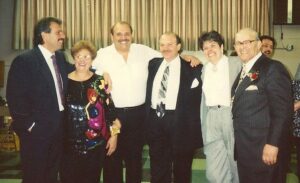 There’s also in Bridgeport, as one might expect, and as a result of all that family, more than a share of lock-step thinking – along with, of course, a slew of lock-step expectations and lock-step behavior.
There’s also in Bridgeport, as one might expect, and as a result of all that family, more than a share of lock-step thinking – along with, of course, a slew of lock-step expectations and lock-step behavior.
Which leads me back to my friend, Carmie.
Carmen, for all he loved family – and, truly, no one did so more than he – the guy somehow always managed to think, move and act, despite all the uniformity, like a man hell bent on carving his own path through life. Because that’s exactly what Carmen Bertucci did – or at least that's what he started doing as he grew older and became more at peace with the man that fate and his own choices had determined he would become.
 I loved Carmen for as long as I knew him. But I especially loved him later in life when, after so many years of not being as forceful as Bruno, as engaging as Bob, or as well known as either, he finally cast aside the world’s expectations of him and began to embrace fully all the things that God gave him the ability to do and, quite often, not do.
I loved Carmen for as long as I knew him. But I especially loved him later in life when, after so many years of not being as forceful as Bruno, as engaging as Bob, or as well known as either, he finally cast aside the world’s expectations of him and began to embrace fully all the things that God gave him the ability to do and, quite often, not do.
He fully embraced, in other words, for the first time in his life, being exactly who he was and what he was meant to be. That’s the point at which Carmen truly started to hit his stride and the world started to finally, at long last, stand up and take notice.
But the story of Carmen Bertucci becoming the Carmen I eventually grew to know and love is, quite literally, a Hollywood story. Let me explain.
One day a few years back, a production crew and a few actors were getting ready to shoot a scene for the hit show Chicago PD. The scene was being shot in Carmie’s Italian social club on 30th and Shields. The club, a few blocks north of Sox Park, remains to this day a humble, one-time residence with all the charm of a bus depot.
Yet, just as he'd done for over two decades with Law & Order in the streets of New York, Chicago PD executive producer Dick Wolf constantly aspired to, whenever possible, shooting on location. Because for an industry built almost entirely on fantasy and  facade, location shots give a TV show the one thing it lacks and covets most, a sense of reality – one that viewers can not only see, but almost taste, touch and even smell.
facade, location shots give a TV show the one thing it lacks and covets most, a sense of reality – one that viewers can not only see, but almost taste, touch and even smell.
Enter Carmen.
That particular day, as the art director and her assistants were busy staging the interior of Carmen’s social club for a scene to be shot, he watched as they brought in and placed a handful of coffee cups on the table at which the actors would sit. Carmie laughed under his breath as they went about their business.
The episode's director noticed the chuckle. So he turned to Carmen and asked, truly intrigued, “What’s so funny?”
Carmie said, “I’m sorry. Nothing. Seriously. I didn’t mean anything by it.”
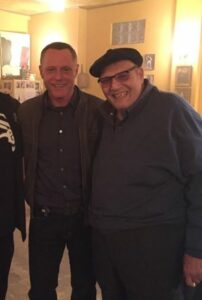 But the director wouldn’t let it go. “No, I mean it. And I’m not challenging you here. Believe me, my friend. I'd just like to know. What exactly did you find so funny?”
But the director wouldn’t let it go. “No, I mean it. And I’m not challenging you here. Believe me, my friend. I'd just like to know. What exactly did you find so funny?”
Carmen cocked his head, shrugged almost apologetically, and offered as diplomatically as his Bridgeport blood would allow, “Well, I don’t know. It’s just that…this is a club, right? It’s not a (expletive) restaurant. I mean, no club worth being a member of would ever have matching coffee cups. I’m sorry. But that just looks stupid. Clubs got cups…mugs…glasses; things that they’ve just, I don’t know, picked up over the years. Know what I mean?”
You'd have thought Einstein had just whispered into the guy’s ear his theory of relativity or some yogi shared with him the secret of life. The director spun toward to the art director with both eyes opened wide, raised an eyebrow and flipped both palms skyward.
“Don’t worry. I’m on it,” said the art director, raising her palms in a gesture of mock surrender.
The very same thing happened with some other prop detail a moment or two later, and once again Carmen tried yet again to stifle yet another snicker. But by then, his bona fides as a red-blooded Italian and true South Sider had been established.
“What now?” offered the director, and once again Carmen told the guy exactly what he thought. And, of course, once again Carmie's little suggested tweak was followed to a T by the crew, almost as though it had come from the burning bush itself.
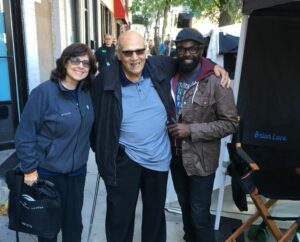 Finally, as the entire cast and crew was rehearsing the scene they’d been setting up all morning long, they got to a particular point in the dialogue. That’s the point at which, rather than laughing, Carmen simply lowered his head quietly, shook it gently and smiled, so as not to be noticed.
Finally, as the entire cast and crew was rehearsing the scene they’d been setting up all morning long, they got to a particular point in the dialogue. That’s the point at which, rather than laughing, Carmen simply lowered his head quietly, shook it gently and smiled, so as not to be noticed.
Hah. Fat chance of that.
“Stop!” said the director. “Now what?” he offered, spinning yet again and looking at Carm as he sat alone in his chair, both of them in the far corner of the club.
Of course, by then the director was hardly alone. The entire cast and crew had turned as well, and they were all now almost leaning en masse toward Carmen, awaiting his next insight into what was ringing so patently untrue about the scene they were all trying so damn hard to shoot, so they could all take lunch and move on to the next location.
“Seriously, what?”
“Nothin’,” said Carmen, raising both hands and shaking his head. “Nothin’ at all. I mean it.”
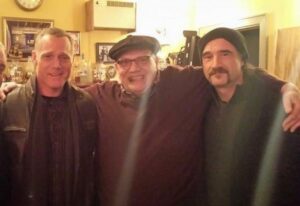 “Stop, OK?” the guy said. “You're killin' me, here. Just tell me, OK? Please, I'm begging you. What is it now?”
“Stop, OK?” the guy said. “You're killin' me, here. Just tell me, OK? Please, I'm begging you. What is it now?”
Carmen proceeded to tell him, “Well, I’m sorry. But no one, and I mean no one, on the South Side would ever talk like that.” “And this guy here,” he said, pointing at the actor, “if he was from Chicago, would never use that word to describe that guy there, who – let’s be honest – is bein' an asshole.”
“What word would he use?”
“What?” asked Carmen.
“I mean if this guy was calling that guy out in an Italian social club on the South Side of Chicago, what word would he use?”
That’s how the cast, crew and team of writers of Chicago PD learned, apparently for the first time, the magical powers of that most wonderfully Chicago word, “jagoff.”
 That too is why the crew’s new favorite word on the set quickly became jagoff, a word that they subsequently began calling one another whenever the situation or someone's action warranted it.
That too is why the crew’s new favorite word on the set quickly became jagoff, a word that they subsequently began calling one another whenever the situation or someone's action warranted it.
And that’s also how my friend Carmen Bertucci, a guy who trafficked in real his whole life and a guy who’d spent decades almost drowning in real, not to mention a guy whose only real job ever was with the city, found himself being employed as both a technical advisor and cast member of one of the most popular shows in television.
That’s right. Carmen Bertucci, on one single afternoon, went from a labor union at one end of the spectrum to a labor union at the far opposite end. From a Teamster, in other words, to a proud member of the Screen Actors Guild.
And while in his few short years as a bit player on Chicago PD, Carmen – or Carmine Lupino, as his character was known (with Carmine being the name all the other actors used when talking to him, even off camera) – didn’t have many lines in many episodes, he had a few – enough, anyway, to earn himself one of the most coveted pieces of cardboard any actor could ever stick in his billfold.
(Along with, of course, his own IMDB and Wiki fan pages.)
And this summer Carmen was buried with that SAG card along with, among other things, a fresh pack of some of the foulest smelling stogies ever put on God’s Earth. But he loved those damn cigars, just as he loved his cheap Franzia wine, a box of which (at least in later years) he always kept within arm’s reach.
It’s sad. For many years of his life, Carmen fought hard to find his footing and place in the world; fought hard to find, for lack of a better description, his inner voice. And he fought longer and harder still against what turned out to be a lifetime’s worth of weight problems.
But while he ended up losing that last battle in grand fashion, I’m happy to report that he emerged victorious in the first two. Bloody and slightly bowed, perhaps. But as unbroken as a man could be.
That’s one of the things that made losing him this past July so hard. Because even as Carmen’s body was breaking down, his mind and spirit were just starting to ramp it up, and just starting to find life's higher gear. He was becoming, after so many fits and starts, the Carmen he’d spent his entire time on this planet trying to become.
We who loved him, of course, would have loved him anyway. But it made it all the sweeter to see him, at long last, at peace with himself.
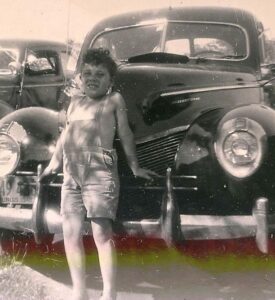 You know, every year at the end of every baseball season the fryers in the Patio are turned off and drained. The grills are scraped clean and shut down. And the walk-in coolers are emptied. The entire place is then covered in plastic and left until spring when a new season of hope beckons.
You know, every year at the end of every baseball season the fryers in the Patio are turned off and drained. The grills are scraped clean and shut down. And the walk-in coolers are emptied. The entire place is then covered in plastic and left until spring when a new season of hope beckons.
But this year, the fryers and grills seem just a little colder and the Patio that much emptier. Because this year, for the first time ever, Bruno, Bobby, little sister Ava, and all the kids and the kids’ kids know that, come next spring, there will be a little less hope in the ballpark, if only by degree.
Because next spring Uncle Carmen’s chair in the corner will remain unfilled. His nasty cigars will be left un-smoked. And his little box of pink wine will be standing there untouched.
A hole, in other words, will be there for all to see. The same hole that existed this Thanksgiving at Ava’s house. The hole that existed on Christmas Eve at Bruno’s house. And the same hole the entire family felt all day long on Christmas at Bobby’s.
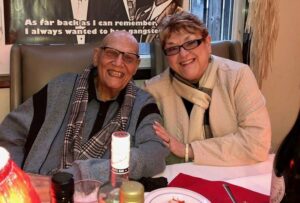 And a hole that will live forever in the heart of Josie, his best friend and wife, and their three boys Carmen, Anthony and Paulie.
And a hole that will live forever in the heart of Josie, his best friend and wife, and their three boys Carmen, Anthony and Paulie.
Their husband and father was a sneaky son of a gun. He truly was. His humor, as devilish as it was, was always dry as a bone. His fierce loyalty regularly lay hidden behind his feigned indifference. And his deep and constant concern for others always seemed tucked away, just an impish grin or two beneath the surface of that deliciously gruff exterior of his.
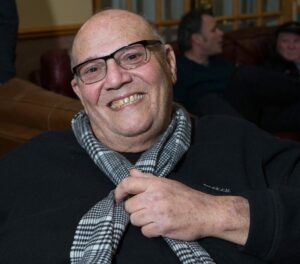 But I knew better. As did anyone and everyone who ever knew and loved Carmen Bertucci. He was, truly, one of a kind. And now he's gone. Yet, of all the people I lost this year, and of all the lives whose passing touched me most in 2019, none impacted me quite the way his did.
But I knew better. As did anyone and everyone who ever knew and loved Carmen Bertucci. He was, truly, one of a kind. And now he's gone. Yet, of all the people I lost this year, and of all the lives whose passing touched me most in 2019, none impacted me quite the way his did.
And, as a result, the world my friend Carmen left behind – much like the lonely fryers and grills in the Patio – is now, and will forever remain, a slightly colder place.
